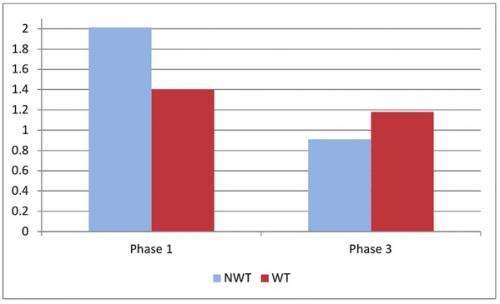February 12, 2013 feature
Internet temptation at work lowers employee productivity

Surfing the Internet is the number one way people waste time at work and costs companies billions of dollars per year, according to a 2005 survey by Salary.com. But a new study shows that, when employees are told not to use the Internet for personal use, the temptation requires so much willpower to resist that worker productivity decreases. The result is not surprising, considering that it's well-established in social psychology that using willpower to delay gratification can detrimentally impact performance on subsequent tasks due to the additional energy exertion.
Research economists Alessandro Bucciol at the University of Verona, Italy; Daniel Houser at George Mason University in Fairfax, Virginia, US; and Marco Piovesan at the University of Copenhagen, Denmark, have published their results on Internet temptation at work in PLoS ONE.
To reach their conclusion, the researchers conducted an experiment in which they asked 60 subjects to perform a series of counting tasks. In each task, subjects watched a video where eight people passed balls of different colors to each other. Subjects had to count the exact number of times a specific ball moved from one person to another, with the level of complexity varying depending on the number of ball passes. Subjects earned small sums of money if they accurately reported the correct answer and smaller sums if they were off by one or two passes. The counting task was intended to be similar to a piece-rate task in a real work environment, where productivity is measured in quality (or accuracy).
The experiment consisted of three phases, starting with a series of three counting tasks, followed by a task that either required willpower or did not require willpower, and ending with a series of 10 more counting tasks. In the second phase, half of the subjects were shown a funny video for 10 minutes and did not have to do anything requiring willpower. The other half were shown a screen with a button labeled "Video" that would start the video, but were asked not to press the button. To increase the temptation, these subjects could hear sounds of the video coming from a different room. If they pressed the button, a message appeared on the screen telling them they should not have pressed the button. If they pressed the button a second time, the researchers considered the subjects overwhelmed by temptation and excluded them from the analysis. Only one subject pressed the button twice.
The results revealed a significant difference in the counting accuracy of the two groups on the final series of counting tasks. All else being equal, subjects who were exposed to temptation by being asked not to watch the video made mistakes that were nearly three times larger than those made by the subjects who were shown the video. The researchers attribute this difference to the fact that exerting willpower depletes energy and makes concentration more difficult. On the other hand, watching the funny video may have helped replenish energy, allowing those subjects to concentrate better on the subsequent counting tasks.
"It is important to understand both how energy is depleted as well as how it is replenished," Houser told Phys.org. "We suspect the [replenishment contribution from watching the funny video] may be very difficult to uncover using our data. Future research exploring this further would be profitable."
The different performances between the two groups held even when the researchers accounted for other factors that may affect counting accuracy. For example, the "willpower" group performed significantly better than the "non-willpower" group on the first phase of counting tasks, suggesting that the willpower group had greater counting skill, on average. Also, both groups performed better after the second phase, reflecting a learning effect. In addition, the researchers controlled for other variables such as age, gender, nationality, field of study, number of household members, and personal budget. Yet in the third phase, the non-willpower group performed better on average than the willpower group, despite performing worse in the first phase.
This study is the first to find a relation between temptation and labor productivity, although a previous study found that the productivity of children is reduced after they are exposed to temptation.
The researchers think that the results may have practical implications for many work environments. Mainly, the findings suggest that employers should not prohibit the Internet for personal use and yet leave it available. Better alternatives would be to either remove the Internet completely or give employees Internet breaks similar to cigarette or coffee breaks.
A few limitations that the researchers noted are that the study assessed productivity on a task that required substantial concentration and allowed little room for error. In work environments where employees perform routine tasks that require little concentration and allow large margins for error, temptation may not have the same detrimental impact on performance. Also, if any of the subjects in the willpower group believed that the temptation they faced was depleting their energy and ability to concentrate, this belief may have impacted their performance. In the future, the researchers hope to further investigate these questions in real-world situations.
"Ideally we would like to test the external validity of our finding using field experiments," Houser said. "Doing so would be facilitated through collaboration with a corporate partner."
More information: Alessandro Bucciol, et al. "Temptation at Work." PLoS ONE. DOI: 10.1371/journal.pone.0053713
Journal information: PLoS ONE
Copyright 2013 Phys.org
All rights reserved. This material may not be published, broadcast, rewritten or redistributed in whole or part without the express written permission of Phys.org.

















